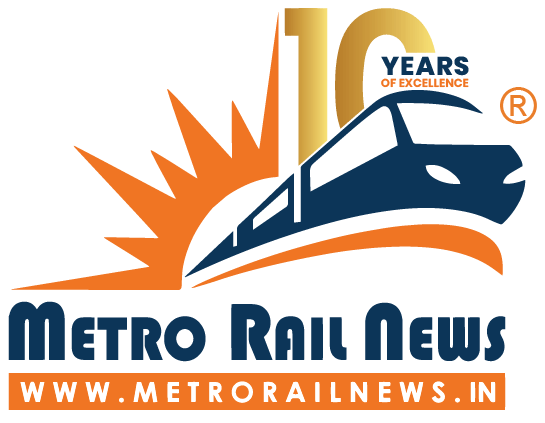Metro Rail News conducted an exclusive interview with Shri Rajesh Kaushal, Vice President, Energy Infrastructure Business Group. In the interview, Shri Rajesh Kaushal, Vice President of the Energy Infrastructure Business Group at Delta Electronics India, spoke about Delta’s journey from a power-electronics company to a complete energy-infrastructure provider. He explained how Delta is supporting Indian Railways’ Net Zero 2030 vision through reliable and efficient power systems. Shri Kaushal mentioned the High Tension Power Quality Restorer (HTPQR), developed in India to improve grid stability. He also talked about Delta’s work in automation, EV charging, and local manufacturing at its Krishnagiri facilities in Tamil Nadu. Shri Kaushal also highlighted new technologies like Green Hydrogen Rectifiers and Solid-State Transformers, showing Delta’s focus on clean and smart railway power solutions. Here are the edited excerpts:
1.You have been associated with Delta Electronics India for nearly two decades and spearheaded multiple business units. How has your journey prepared you for your current role as Vice President of the Energy Infrastructure Business Group?
My association with Delta Electronics India spans almost two decades, during which I have witnessed the company’s evolution from a power-electronics pioneer into a comprehensive energy-infrastructure provider. Leading diverse businesses from industrial display solutions to renewable and EV solutions has helped me understand how power conversion, control, and digitalization converge to deliver sustainable outcomes. Today, as Vice President of EISBG, my focus is on integrating these competencies into a unified platform that supports India’s transition toward cleaner, more resilient, and digitally intelligent infrastructure.
2.What are the strategic priorities of EISBG in supporting India’s fast-expanding railway network?
Our foremost priority is to empower Indian Railways with reliable, efficient, and digitally connected power systems. Delta’s offered solutions follow RDSO guidelines making it easily adoptable to Railway requirements. High Tension Power Quality Restorer (HTPQR) is a prime example for a Made in India medium-voltage solution that dynamically compensates reactive power, eliminates harmonics, and stabilizes substation voltage.
The successful deployment of Power Quality solutions, running successfully for more than 5 years in multiple sites has eliminated harmonic penalties and achieved unity power factors, directly improving operational efficiency. Alongside, we are advancing with Advanced Chemistry Cells for our energy-storage solutions that align with Indian Railways’ Net Zero 2030 vision. Our strategy is clear: deliver technology that strengthens grid reliability while supporting decarbonization and smart-energy management across the rail ecosystem.
3.How can Delta’s automation solutions address the multiple segments of the railway supply chain to make it smarter and more resilient?
Railway networks demand seamless coordination across power, signalling, and station systems. Delta’s display solutions and control portfolio including PLCs, HMIs, the DIALink SCADA platform, and DIAView Block Control System creates a digital spine for end-to-end visibility. Integrated with our power-quality and conditioning systems, these solutions enable real-time monitoring of electrical parameters, predictive maintenance, and data-driven decision-making. By linking substations, depots, and passenger facilities through one secure digital layer, Delta helps operators achieve higher uptime, faster fault response, and measurable energy savings that are key enablers for “Smart Rail 2.0.”
4. Delta Electronics India has invested in six factories at Krishnagiri, Tamil Nadu. How are these facilities contributing to “Make in India” for railway and metro-specific solutions?
The Krishnagiri complex is Delta’s largest manufacturing investment in India and a cornerstone of our Make in India commitment. The six factories produce a full spectrum of energy-infrastructure solutions – HTPQR systems, Power Conditioning Systems, EV Chargers, Solar Inverters, and Display Solutions that are all designed, engineered, and manufactured locally. Each product complies with global standards such as IEEE 519-2014 and IEC norms while being optimized for Indian grid and climatic conditions. Beyond import substitution, these facilities enable technology export to global railway and industrial customers, positioning India as a high-value innovation and manufacturing hub for Delta Electronics.
5. Delta Electronics India provides MV Power Quality Solutions (2MW to 7.5MW) for industries and railways. Could you explain how these solutions help improve reliability and efficiency in railway operations?
Power-quality fluctuations are a major challenge in large station networks. Delta’s HTPQR addresses this by providing dynamic reactive-power compensation and current-harmonic suppression up to the 13ᵗʰ order. The system operates at 11 kV / 33 kV and delivers up to 7.5 MVA with transformer-less, high-efficiency architecture.
At multiple sites in India, our installations reduced Total Demand Distortion, eliminating a monthly harmonic surcharge. Similar success in industrial applications where grid-voltage variation improved by 71% demonstrates how Delta’s power-quality technology enhances energy reliability, extends asset life, and ensures compliance with grid standards.
6.With a team of over 500 engineers in R&D, how is Delta Electronics India evolving to align with Indian Railways’ push for sustainability, digitalisation, and smart grid integration?
Delta’s R&D centers in Bengaluru and Gurgaon serve as the innovation nucleus for our India operations. Our engineers are developing AI-driven control algorithms, IoT-enabled communication architectures, and simulation platforms for grid-interactive products such as HTPQR, Battery Energy-Storage Systems with Advanced Chemistry Cells technology, and Solid-State Transformers.
Delta has the capability to customise the products for Indian Railway considering the unique requirement of single-phase Mega Watt Scale infrastructure, as we have regional dedicated RD. This localization ensures faster customization for railway applications while meeting global compliance benchmarks. Our R&D roadmap also integrates renewable-energy coupling and smart-grid protocols, enabling Indian Railways to adopt cleaner power with intelligent monitoring and control that is an essential step toward a digital, carbon-neutral network.
7.In the highly competitive EV charging infrastructure domain, what differentiates Delta Electronics India from other players?
Delta stands apart through its end-to-end capability covering AC chargers, DC Fast and Ultra-Fast chargers up to 360 kW and beyond, cloud-based energy-management platforms, and nationwide service coverage. We have deployed more than 9,000+ chargers across India, supported by our 24×7 unified technical-support network. Our chargers are interoperable, renewable-ready, and backed by local manufacturing. For fleet and railway ecosystems, this means scalable, reliable, and digitally manageable charging infrastructure that complements India’s shift to electric mobility.
8.Delta Electronics India provides isolated DC/DC power converters for railway applications under the European Standard EN 50155. Could you explain how compliance with this standard ensures reliability and safety in railway operations?
EN 50155 compliance ensures that Delta’s DC/DC converters deliver consistent performance under vibration, shock, humidity, and temperature extremes encountered in rolling stock. These converters guarantee galvanic isolation for passenger and equipment safety and are validated for electromagnetic compatibility and long service life. Meeting this standard underscore Delta’s commitment to safety, reliability, and global best practices that attributes that rail operators value when deploying mission-critical electronics.
9.What role do you see EV charging infrastructure playing at railway stations, parking hubs, and feeder services in supporting sustainable rail transport? How can Delta’s EV charging solutions contribute to this?
Railway stations are fast emerging as multimodal energy hubs. Integrating EV-charging infrastructure at these nodes supports first- and last-mile connectivity while reinforcing India’s clean-mobility vision. Delta’s range of AC and DC chargers, combined with smart load management and renewable integration capabilities, allows stations to operate partially or fully on green power. This reduces operational carbon footprint, supports passenger convenience, and enhances the overall sustainability profile of India’s rail ecosystem.
10.Delta Electronics India is developing modern solutions such as Green Hydrogen Rectifiers and Solid State Transformers (SST). How relevant are these for India’s rail ecosystem?
Green Hydrogen Rectifiers and SSTs represent the next stage of power-infrastructure evolution. Delta’s rectifiers facilitate efficient DC conversion for electrolysers, enabling green-hydrogen generation that can eventually power hydrogen-based locomotives or auxiliary systems. Our Solid-State Transformers, on the other hand, provide compact, high-efficiency, bidirectional power flow better suited for advanced RE integrated Substations. Both technologies will be instrumental as Indian Railways experiments with smart substations, and microgrid integration in the coming decade.
11.How does Delta Electronics India ensure that its solutions and products meet global standards while remaining affordable and competitive in the market?
Delta combines global quality processes with local value engineering. Every product, whether HTPQR, PCS, or EV Charger undergoes validation against IEC, EN, and BIS standards. Local R&D, supply-chain integration, and large-scale manufacturing optimize costs while maintaining world-class reliability. This “Global Standards + Local Value” approach allows Delta to offer advanced technology at competitive price points, giving customers the best total-ownership economics in the industry.
12.What message would you like to give to the readers of Metro Rail News Magazine?
IREE 2025 reflects India’s transformation into a global rail-manufacturing powerhouse. Delta Electronics India is proud to be part of this journey delivering Power Quality, Display Solutions, Battery Energy Storage, and EV Infrastructure Solutions that empower railways to become greener, smarter, and more self-reliant. Our message to the industry is simple: reliability and sustainability are no longer choices; they are design principles. We invite our partners and customers to collaborate with Delta in shaping the next era of intelligent, carbon-neutral rail infrastructure for India and beyond.





